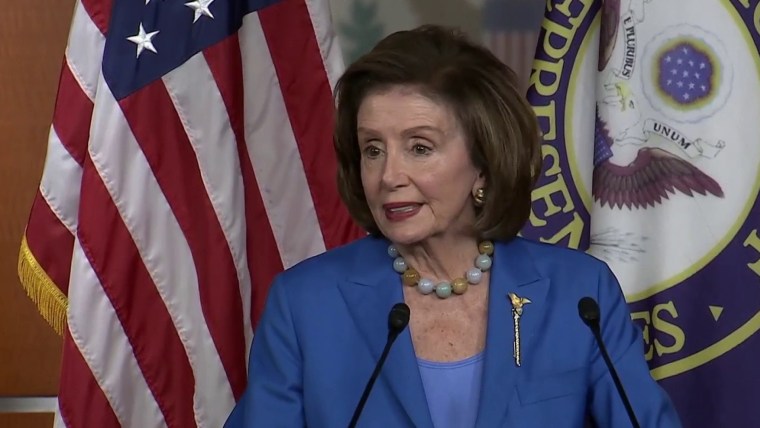WASHINGTON — If Democrats don’t get their act together soon on President Joe Biden‘s “Build Back Better” plan, they will sink their own agenda and put their hold on power at greater risk.
But no one wants to do the legislative triage necessary to slim a $3.5 trillion expansion of the social safety net down to $1.5 trillion or $2 trillion. The White House insists that congressional leaders need to start making politically painful choices; lawmakers say Biden has to be more assertive in negotiations.
“It’s really important that President Biden use active shuttle diplomacy to get this done because my view is, we’ve got to have a good framework by the end of this month and then be able to convert that into legislation to get it passed by the mid-November period,” Sen. Chris Van Hollen, D-Md., said in a telephone interview with NBC News this week.
“That shuttle diplomacy — it could be at the White House, having people in different rooms — whatever it takes, that needs to happen yesterday,” he added.
For months, there has been no discernible progress toward a deal, and there are few public signs that will change soon. Many lawmakers are placing their own interests — whether ideological, electoral or personal — above what the overwhelming majority of them see as the collective good of the catchall budget “reconciliation” bill that contains most of the remaining items in Biden’s domestic agenda.
The House version of Biden’s plan would tax corporations and wealthier Americans to: expand Medicare to cover dental, vision and hearing services and allow the federal government to negotiate lower prescription drug prices under the federal health insurance program for the elderly; pay for free community college; further subsidize housing for the poor; provide for child care; and establish electric-vehicle incentives.
Though the plan is certain to be diluted by the more narrow interests of particular lawmakers, Democrats still have a chance to salvage much of it.
If they fail, it will be because a handful of them decide too little is too much.
In other words, progressives are going to have to give up on some of their goals to achieve others. But they have resisted making those choices themselves as the try to gauge what they can and can’t get from the pivotal moderate Senate Democrats, Sens. Joe Manchin, D-W.Va., and Kyrsten Sinema, D-Ariz.
“We first need a clear understanding of what Manchin and Sinema will agree to,” said Rep. Ro Khanna, D-Calif., a member of the Congressional Progressive Caucus. “It’s all an exercise in make-believe until then.”
At some level, the progressives don’t want to hear what the moderates are saying. When the Senate agreed to start the budget “reconciliation” process, Manchin told Senate Majority Leader Chuck Schumer, D-N.Y. — in a note that both of them signed — that he would accept a bottom line of $1.5 trillion. Sinema has resisted making a bargain before the House passes a separate bipartisan infrastructure measure that progressives blocked a few weeks ago.
Biden was so unwilling to upset his progressive faction that he helped delay his own infrastructure bill to protect their legislative strategy. Progressives have been holding the infrastructure bill hostage because they worry moderates will walk away from negotiations if it becomes law.
Like Pelosi and Schumer, Biden is trying to walk a tightrope after raising progressives’ expectations. But they all know that Manchin, Sinema and a handful of House moderates hold out-sized power in the discussions because any deal would fail if Democrats lost a single vote in the Senate or more than three votes in the House.
To get a deal, they will have to disappoint progressives — because the plan is essentially a compilation of progressive legislative proposals. But they also risk losing votes based on which parts of the original plan are eliminated or cut back. That’s because each program has a constituency in Congress. It is possible that some progressives could rebel against a deal that they see as insufficiently good.
They say they will.
Rep. Pramila Jayapal, D-Wash., the leader of the Congressional Progressive Caucus, told a group of activists this week that nothing may be better than something.
“‘A lot of people have asked: ‘Isn’t something better than nothing?,'” she said, according to Politico. “And the answer, quite simply, is no. Because when it comes down to something rather than nothing, it’s the same people who are forced to settle for nothing over and over and over again.”
She and Vermont Sen. Bernie Sanders, an independent who caucuses with Democrats, have said that they will not give ground on the proposal to expand Medicare — an idea that is anathema to Manchin.
Sanders escalated the fight Friday by publishing an op-ed extolling the provisions of Biden’s plan in Manchin’s home state.
“The political problem we face is that in a 50-50 Senate we need every Democratic senator to vote ‘yes,'” Sanders wrote. “We now have only 48. Two Democratic senators remain in opposition, including Sen. Joe Manchin.”
Manchin fired back on Twitter.
“I will not vote for a reckless expansion of government programs,” Manchin said. “No op-ed from a self-declared independent socialist is going to change that.”
While the White House has not made any official concessions, multiple sources told NBC News that a $150 billion Clean Energy Performance Program at the heart of Biden’s efforts to fight climate change is likely to be dropped to appease Manchin. That accounts for only a fraction of the $1.5 trillion to $2 trillion that would have to be cut back to reach his bottom line.
Biden, who stood with progressives in holding up his own infrastructure bill, clearly doesn’t want to get blamed for playing the heavy with his political base.
“I think Team Biden has made a fundamental decision that they only want to roll the progressives one time,” said a Democratic lobbyist and former House leadership aide.
If that’s the case, it remains to be seen who will roll them, how and when — and whether they will ultimately accept getting rolled by voting for a slimmed-down measure.
Progressives will end up with less than what Biden proposed. The question is whether they will gain anything at all.
Source: | This article originally belongs to Nbcnews.com










